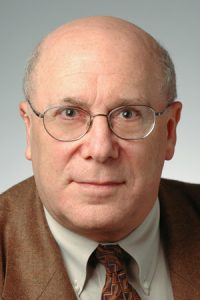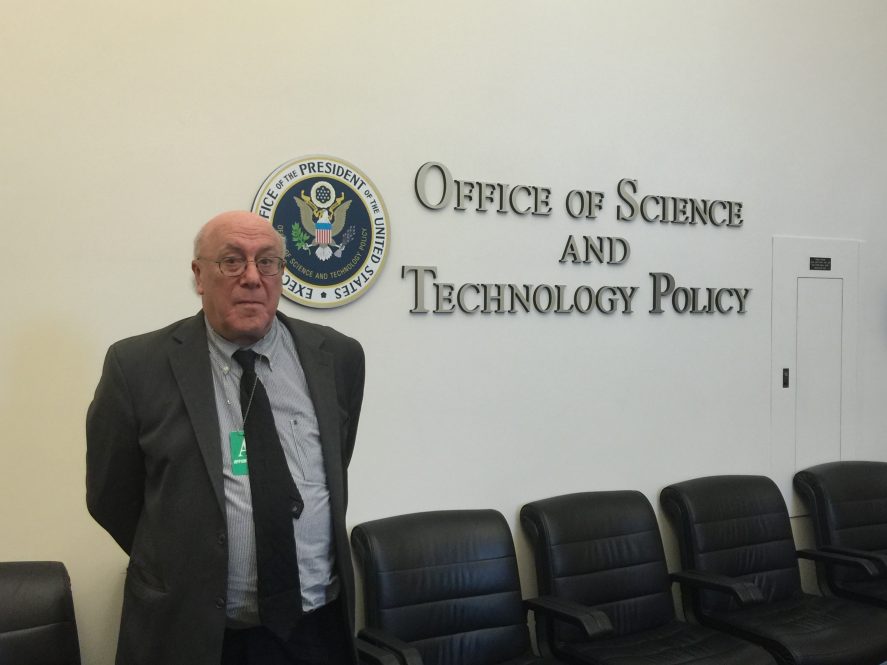During his distinguished career, Philip Rubin established himself not just as a world-class researcher, but also as facilitator who brought together experts across different disciplines.
Rubin ’73 ’75 (CLAS), the chair of the Board of Trustees Research, Entrepreneurship, and Innovation (REI) committee, gets a first-hand look at the important progress that UConn researchers make. He is continually impressed with the output and innovation of University faculty and students.
“The greatest challenges facing us right now are the major issues of the day,” says Rubin. “It’s important for the United States and Connecticut to be as competitive as possible and be a model to the world for research and entrepreneurship. We always have, and I hope we continue to do so.”
A Lifetime of Research Excellence
Few people are as qualified as Rubin to make assessments on the status of research and innovation. He spent his career as a cognitive scientist, technologist, and administrator focused on science policy and ethics. In addition to his teaching and research career at UConn and Yale, he has served four different U.S. presidents in various capacities.

Early in the 21st century, Rubin directed the NSF Division of Behavioral and Cognitive Sciences. He would later be appointed principal assistant director to the President’s Office of Science and Technology Policy. His work spans the administrations of Bill Clinton to Barack Obama, influencing preparation and policy on issues including Ebola prevention and crisis response.
During the Obama Administration, Rubin led neuroscience efforts that included the BRAIN Initiative, a collaboration of researchers in the public and private sectors seeking to apply technology to understand the brain’s function. Those initiatives paralleled his research in technological and theoretical developments related to understanding speech and language disorders.
Beyond the White House, Rubin has served as chair or board member of numerous organizations dedicated to the advancement of science. He is a chair of Haskins Laboratories in New Haven (where he also conducted his postdoctoral research), is an adjunct professor at the Yale School of Medicine, and a research affiliate at Yale. He is also the past president of the Federation of Associations in Behavioral and Brain Sciences. Recently, he became president of Rothschild-Wilder, a nonprofit, private foundation dedicated to supporting social justice initiatives, science, arts and humanities, and preserving cultural artifacts.
While his professional and academic bona fides establish his reputation, Rubin says that one of his main roles has been a facilitator of intelligent and talented people. Somewhat serendipitously, he has found himself “in the right place at the right time” on several occasions, leaning into his skills to get the best out of collaborations.
“It’s all about experiences and contacts,” says Rubin. “I have been fortunate to stand on the shoulders of giants.”
Research at UConn
Rubin enjoys his role on the UConn Board of Trustees, particularly with the REI committee. He has forged good relationships with UConn research leadership, including the Office for the Vice President of Research and the Provost’s Office.
“Dr. Rubin’s wisdom, expertise, and experience make him an excellent mentor and friend to UConn research and all that we aspire to be as an enterprise,” says Pamir Alpay, Vice President for Research, Innovation, and Entrepreneurship. “He has helped shape policy across several levels, from his work with the federal government to his collaborations with prestigious societies and organizations. His wealth of knowledge is priceless to UConn.”
Rubin believes that the University must consider many factors that lead to success, from the student life experience to the quality of laboratory facilities. Echoing his role as a facilitator, he encourages communicating across UConn to understand needs, which in turn will lead to greater success in the classroom and in research.
“What impresses me has been the continual increase in the quality of students, faculty, and administration through the years,” says Rubin. “The change in the campus is remarkable. Take the new Science 1 building, for example. You’re not going to be able to teach well and learn well if you don’t have good facilities. The support from the State, as well as the UConn Foundation, has been exceptional.”
UConn has prioritized advanced research in areas such as artificial intelligence, security, health across the lifespan, global literacy, and quantum technology. The latter is exemplified by the QuantumCT initiative, which Yale and UConn co-lead, designed to transform Connecticut into the nation’s accelerator for quantum technology and applications.
Rubin says he is impressed with UConn’s research focuses, as well as the University’s continued support of the humanities. The success extends beyond Storrs and UConn Health in Farmington to breakthroughs occurring at regional campuses, such in fintech in Stamford, marine science at Avery Point, and neurodiversity at Waterbury.
“I am a strong supporter of interdisciplinary research,” Rubin says. “Innovation can be strengthened greatly by diversity and inclusion, getting different points of view.”
The Future of Research
The present research climate is a challenge for UConn, as well as other universities and institutes across the country. Rubin says it is common for priorities to change with the transition of presidential administrations, and he values the breadth of opinions. Yet he worries about the impact of indirect cost caps at agencies like the NSF and NIH, as well as terminations of previously awarded grants.
Indirect costs are reimbursements for expenses that propel research and innovation. Though there are challenges in federal courts, the NIH and NSF are two of several agencies seeking to cap indirect cost funding at 15%, which would pose major financial hardships in the ability of universities to conduct federal research.
“We’re living in interesting times right now,” says Rubin. “There have been times in modern history that have been challenging. There’s great misunderstanding on the part of the public and great misuse by politicians on indirect costs. They impact ability to purchase or rent equipment, facilities, and pay the salaries for associated researchers, analysts, and support personnel.”
Despite the challenges, Rubin is confident that UConn can adapt and succeed. He is impressed with President Radenka Maric and University leadership, who have prioritized students and research.
“We have a remarkable president in Dr. Maric who understands the numerous constraints facing research,” Rubin says. “We have the great ability to bring together research excellence and education in areas that are really important.”



